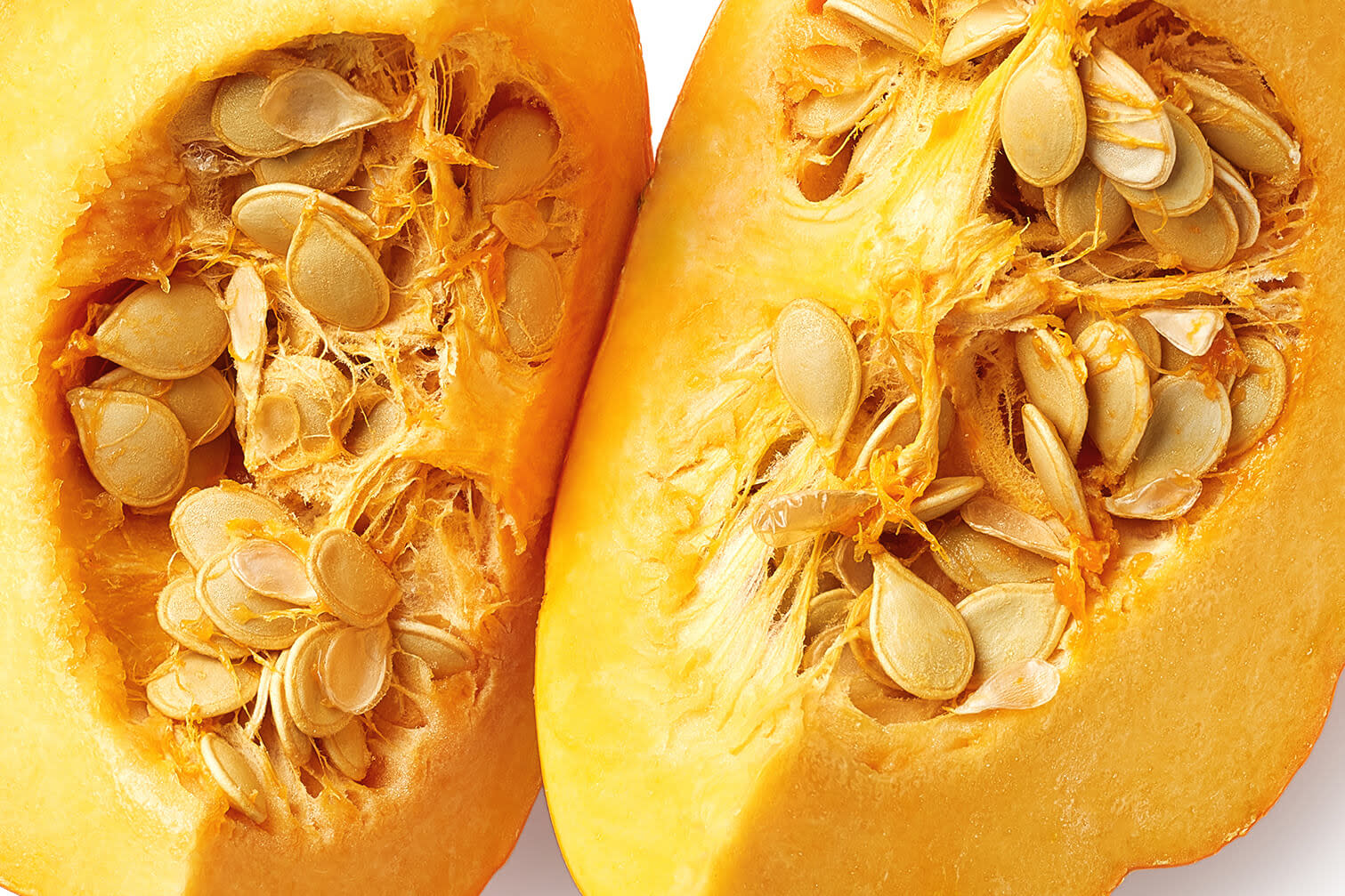
6 Key Benefits of Pumpkin Seeds
- By Carolina Schneider, MS RD
- Updated: September 2025

When it comes to nutrition, pumpkin seeds pack a lot of bang for their buck. These tiny seeds are loaded with valuable nutrients that we need for health and wellbeing. Here are 4 key benefits of pumpkin seeds and tips for how to enjoy them in your day-to-day.
Macronutrients: we’re talking about protein, fats, and carbohydrates. Pumpkin seeds have a mix of them all. One ounce of pumpkin seeds gives you nearly nine grams of protein. That ounce of pumpkin seeds also has three grams of carbohydrates, two grams of which come as dietary fiber (hello, happy gut). But the real highlight of pumpkin seed macros is the mono- and polyunsaturated fats, aka the good types known to promote heart health.

Pumpkin seed nutrition doesn’t end with macronutrients: they’re a strong source of micronutrients too.
Let’s start with iron. A one-ounce serving of pumpkin seeds gets you about 14% of the daily value of this essential mineral. We need iron to help carry and store oxygen in the body and to make and repair DNA. Iron also plays an important role in energy metabolism.
Next up: zinc. Pumpkin seeds have a lot of it—one ounce gives you 2.21 mg of zinc---the daily value for zinc is 11mg (so that's 20% btw). This essential mineral plays a vital role in immune function, growth and development, vision, neurotransmission, and much more.
Pumpkin seeds are also loaded with copper, needed for energy production, central nervous system function, and gene regulation.
But wait, there’s more. Well, one more. The seeds also contain magnesium, a mineral involved in hundreds of metabolic reactions.
Add them to salads for texture; sprinkle them on soups; pumpkin seeds are also great as a topping for stir-fry and bowls.
Phenolics are compounds unique to plant foods. We don’t need them like we need macro and micronutrients (we won’t develop a deficiency without them), they just help kick our health up a notch. The ones found in pumpkin seeds can help keep cells healthy and protect against cell damage.
Pumpkin seeds are rich in nutrients that contribute to cardiovascular health, such as magnesium and antioxidants. Magnesium plays a crucial role in regulating blood pressure levels and preventing hypertension, while antioxidants in vitamin E and zinc protect the heart by reducing oxidative stress and inflammation, both of which are linked to heart disease (Source). Additionally, the unsaturated ("healthy") fats in pumpkin seeds are known to improve cholesterol levels, reducing LDL ("bad") cholesterol and lowering the risk for heart complications. (Source)
Pumpkin seeds are naturally abundant in magnesium and tryptophan, two nutrients linked to improved sleep. Research suggests magnesium may improve sleep duration and sleep quality. (Source) Tryptophan, an amino acid in pumpkin seeds, is also known for its sleep-promoting properties. One preliminary study found that daily intake of 1 gram of tryptophan significantly improved sleep quality, although more research is needed. (Source)
Carolina Schneider, MS RD
Nutritionist
Carolina Schneider, MS, RD is a Registered Dietitian and founder of Hungry for Plants. She specializes in plant-based nutrition and has followed a whole-food, vegan diet for nearly a decade. With a background in journalism, marketing and public relations, Carolina is adept in creating nutrition content for health and wellness companies that prioritizes the brand’s positioning to consumers. Her experience, combined with her passion and knowledge, equip her to help companies successfully communicate the nutritional benefits of their products to consumers. Originally from Brazil, Carolina is fluent in Portuguese, English and Spanish. Carolina received two degrees in Journalism and Public Relations, which have given her the tools to become a writer and excellent communicator. Additionally, Carolina has years of professional experience in marketing, specifically in the food industry, giving her the knowledge to help brands best position their products to reach new customers and improve brand loyalty. Carolina obtained her Master of Science degree in Nutrition & Dietetics, and is passionate about nutrition science and helping individuals improve health and wellbeing through food.
When would you like your next delivery?
Note On Your Existing Order
Order #{{number}} for your most recent box has already been processed and is still scheduled to arrive {{date}}.
I understand Save CancelYou must meet the minimum order requirements for the box to ship. Add your replacement item(s) first and then try deleting this again.
When would you like your next delivery?
Note On Your Existing Order
Order #{{number}} for your most recent box has already been processed and is still scheduled to arrive {{date}}.
I understand Save CancelYou must meet the minimum order requirements for the box to ship. Add your replacement item(s) first and then try deleting this again.
Loading...